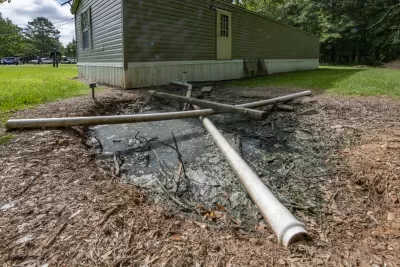Newly announced federal funding will help resolve the decades’ long sewer crisis faced by rural majority-Black communities in Alabama and Mississippi.

This week the Federal Environmental Protection Agency (EPA) announced funding that will help address years of neglect of wastewater infrastructure in the Black Belt, “a crescent of rural, majority-Black communities stretching from eastern Texas to southern Virginia,” reports Willy Blackmore in an article for Word in Black.
The funding, part of the Biden Administration's Closing the Water Access Gap, will go toward creating or upgrading sewers, drainage, and septic systems in 150 rural U.S. communities, including several mostly-Black enclaves in Alabama and Mississippi. It represents an expansion of a successful pilot program in Lowndes County, Alabama — “a majority-Black, low-income community where residents lacked access to the kind of municipal water infrastructure that most people take for granted,” Blackmore writes.
Lack of investment in water and sewer systems has been a critical issue in the Black Belt for decades, even prompting a federal civil rights investigation. A Columbia University study estimates that 90 percent of septic systems in Alabama’s Black Belt are functioning poorly or not at all, largely because of the region’s heavy poor-draining clay soil, causing waste to back up into houses during heavy rains. According to an article in Southern Science, an estimated 50 percent of homes in that region have raw sewage on the ground due to inadequate or failing treatment systems.
“In expanding the program to 150 additional communities, we are working to restore dignity and opportunity to underserved communities nationwide,” Radhika Fox, the EPA’s assistant administrator for water, said in a statement.
FULL STORY: Feds Are Finally Taking Action on Alabama’s Black Belt Sewer Crisis

Alabama: Trump Terminates Settlements for Black Communities Harmed By Raw Sewage
Trump deemed the landmark civil rights agreement “illegal DEI and environmental justice policy.”

Planetizen Federal Action Tracker
A weekly monitor of how Trump’s orders and actions are impacting planners and planning in America.

The 120 Year Old Tiny Home Villages That Sheltered San Francisco’s Earthquake Refugees
More than a century ago, San Francisco mobilized to house thousands of residents displaced by the 1906 earthquake. Could their strategy offer a model for the present?

In Both Crashes and Crime, Public Transportation is Far Safer than Driving
Contrary to popular assumptions, public transportation has far lower crash and crime rates than automobile travel. For safer communities, improve and encourage transit travel.

Report: Zoning Reforms Should Complement Nashville’s Ambitious Transit Plan
Without reform, restrictive zoning codes will limit the impact of the city’s planned transit expansion and could exclude some of the residents who depend on transit the most.

Judge Orders Release of Frozen IRA, IIJA Funding
The decision is a victory for environmental groups who charged that freezing funds for critical infrastructure and disaster response programs caused “real and irreparable harm” to communities.
Urban Design for Planners 1: Software Tools
This six-course series explores essential urban design concepts using open source software and equips planners with the tools they need to participate fully in the urban design process.
Planning for Universal Design
Learn the tools for implementing Universal Design in planning regulations.
Clanton & Associates, Inc.
Jessamine County Fiscal Court
Institute for Housing and Urban Development Studies (IHS)
City of Grandview
Harvard GSD Executive Education
Toledo-Lucas County Plan Commissions
Salt Lake City
NYU Wagner Graduate School of Public Service





























